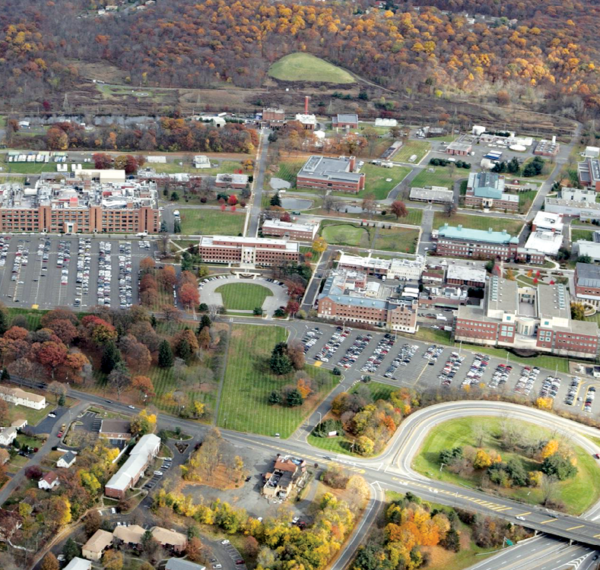
- Developer Stuart Lichter plans to turn this Pearl River site into a mixed-use, multi-tenant campus that would include residences and a hotel.
California real estate developer Stuart Lichter returned to metropolitan New York recently with a vision for future business on a reconfigured commercial campus in Rockland County and memories of the start of his company in Westchester County more than 40 years ago.
His Los Angeles-based company, Industrial Realty Group LLC, in November closed on its $39.45 million purchase of most of the developed portion of the 550-acre Pearl River campus of Pfizer Inc., the pharmaceuticals developer and manufacturer. The deal came after about two years of negotiations and about five years after Pfizer took over the former Wyeth Pharmaceuticals headquarters on Middletown Road after acquiring its biopharma rival and began downsizing operations on the site.
Lichter and IRG want to adapt the pharmaceutical campus as more than an office and laboratory complex occupied by multiple tenants. On a website launched last month on the day the property sale closed, the company announced the facility “will be reimagined into a shopping, dining, meeting and educational destination.”
IRG acquired 38 buildings with more than 2 million square feet of space and about 200 acres of a property whose history of commercial drug manufacturing dates to 1907, said a spokesperson for the privately owned real estate development and investment company.
IRG and Pfizer representatives said Pfizer will retain 25 acres and about 500,000 square feet of office and laboratory space at the southern end of the property for research and development. Pfizer will lease back about 1.2 million square feet from IRG for production operations under short-term and long-term leases.
Much of that leased space will be vacated by Pfizer in early 2017, including the site”™s 950,000-square-foot central building where the company produces its Prevnar vaccine. Pfizer will continue to produce its antibody cancer drugs at Pearl River, said Kerrin Mahaffey, Pfizer vice president of operations and Pearl River site leader.
Mahaffey said the company employs about 570 workers in manufacturing and 600 in research and development on the campus. In addition to the research and development operation, about 75 to 80 manufacturing jobs will remain after Pfizer shuts down its main manufacturing operation in 2017, she said.
“This transition has been going on for five years,” Mahaffey said of the serial job cuts and downsized operations that followed Pfizer”™s 2009 takeover of Wyeth.
Lichter was joined by other IRG and Pfizer officials and brokers from Colliers International, IRG”™s campus leasing agent, at a private event on Dec. 1 to celebrate the completed deal with Rockland business leaders and elected officials. IRG”™s purchase agreement was first announced last May.
Richard Struck, interim president and CEO of the Rockland Economic Development Corp., which worked with Pfizer and IRG on the deal, cited IRG”™s national stature in the real estate industry, managing more than 120 properties in 28 states with more than 100 million square feet of leased space. “Very few companies could have come along to provide that kind of presence in our community,” he said.
Lichter said IRG officials and the company”™s leasing brokers at Colliers, John Cunningham and Ian Ceppos, are talking to “a large numbers of companies” as prospective tenants from the biotech, medical technology, office and manufacturing sectors.
Cunningham, executive managing director in Colliers”™ Parsippany, N.J. office, noted that medical device companies have shown interest in the site. “There”™s great opportunity here,” he said. “The ability to compete across the board in many product types will fill this place up.”
IRG”™s director of real estate, Onno Steger, said the new owner is “very close” to signing lease deals with a number of companies and expects to announce one tenant this month and a few more early next year.
Lichter cautioned that leasing the available campus space will be a long-term process. “We”™re talking years, not months,” he said. “Right now there”™s a glut of space like this littered all over New Jersey. So we do have a lot of competition.”
For the 70 to 100 acres of vacant land owned by IRG on the site, “We have a vision,” Lichter said. “We feel we have to create a nice environment” that includes a mix of retail, office, medical and a hotel, he said. The mixed-use project would also include a residential development primarily to house young employees on the campus, he said.
To execute the company”™s vision and transform the campus for mixed uses, “A lot of people have to buy into zoning changes and other things,” he said.
Lichter said that typically lengthy process of municipal review and community input on IRG”™s proposal for the property has not begun. “We”™re still visioning it,” he said.
In place of traditional zoning for specific property uses, “If you want to have a young vibrant community, you need to create something that”™s a little smudged together,” the developer said.
Millennials prefer urban living and lifestyles to suburban communities, he said. “You can”™t re-create New York City here. But you can produce some of it on a smaller scale.”
For Lichter, the Pearl River deal brought him back to his business roots in the tristate region and a reunion with family. His father lives five miles from the campus in Rockland County, he said, and a sister lives in Larchmont.
Lichter, who completed graduate studies in business administration at Pace University but did not receive his master”™s degree, started his business in Larchmont in 1974 when he purchased a two-story, Tudor-style office and retail building on downtown Palmer Avenue. IRG still has its regional management office there, where it employs 15 people.
IRG”™s portfolio has grown to include industrial and warehouse buildings, shopping centers, business parks, hotels, mini-storage facilities, marinas, apartments, mobile home parks and mixed use-developments that include McClellan Park, IRG”™s 8.5-million-square-foot redevelopment of the former McClellan Air Force Base in Sacramento.



















